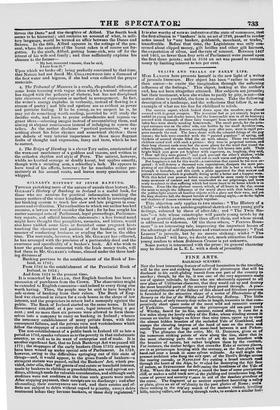TRAITS AND TRIALS OF EARLY LIFE.
Miss LANDON here presents herself in the new light of a writer of juvenile literature. Her object has been " rather to interest than amuse—to excite the imagination through the softening influence of the feelings." This object, looking at the author's end, has not been altogether attained. Her subjects are juvenile; but their treatment, when she wishes to purify by pity, is not—the matter alone is youthful, the form is mature. Take the following description of a landscape, and the reflections that follow it. as an example of what are too fine for childhood to relish.
The western aspect, which looked down upon the meadow, was almost covered with fragrant creepers. The jessamine had as yet scarcely begun to unfold its young and slender leaves, but the honeysuckle was in all its bravery; covered with thousands of those fairy trumpets from whose sweet breath the laden bees were slowly wending homewards. The small porch, for the prin- cipal entrance was on the other side, was hidden by the small Ayrshire rose, whose delicate crimson flowers, ascending year after year, were in rapid pro- gress towards the roof. The lawn shone with the coloured foliage of the gay season ; the beds were crowded with the " painted populace" of spring, and thickets of scented shrubs filled the air with odours. Those two beautiful children suited well with such a picture : they were in perpetual motion, and their long chesnut curls were but the more glossy for the wind that tossed the silken lengths, and the sunshine that turned the rich brown into gold. Their bright black eyes grew yet brighter with eagerness, as, laughing, they said, " How tall they were grown !" and each pursued the other's shadow, while the exercise deepened the already vivid red on each warm and glowing cheek.
But happiness is not for this world—a conviction that cannot be too soon ac- quired : it will destroy a thousand vain expectations, dissipate the most per- plexing of our illusions—the early knowledge that life is but a trial, whose triumph is hereafter, and this earth a place appointed for that sorrow and patient endurance which is gradually fitting us for a better and a happier state. With this belief ever present before us, we should be more ready to enjoy the many moments of content and rest vouchsafed on our pilgrimage, and more ready to submit to that suffering which but turns heart to its home which is in heaven. Even like the glorious sunset, which, of all hours in the day, seems the most to mingle the influences of the world above with that below, when the golden light invests all familiar objects with a glory not their own, and yet the long shadows fall, the deepest heralds of the coming night,—so do the lights and shadows of human existence mingle together.
This objection only applies to two stories: " The History of a Child "—which is an autobiographical sketch of a very young girl's feelings, coloured by those of after-life ; and " The Twin Sis. ters "—a tale whose catastrophe will puzzle young minds by its want of poetical justice, rather than affect them, and whose moral is addressed to widowers. Of the three others, " Frances Beau- mont" is an interesting tale, impressing the important lesson of the advantage of self-dependence and sweetness of temper; " First Lessons " is .juvenile, but by no means striking; whilst " The Indian Island" will have, we doubt not, much attraction for those young readers to whom Robinson Crusoe is yet unknown. Some poetry is intermixed with the prose: its general character may be described as L. E. L. with a dash of juvenility.


























 Previous page
Previous page